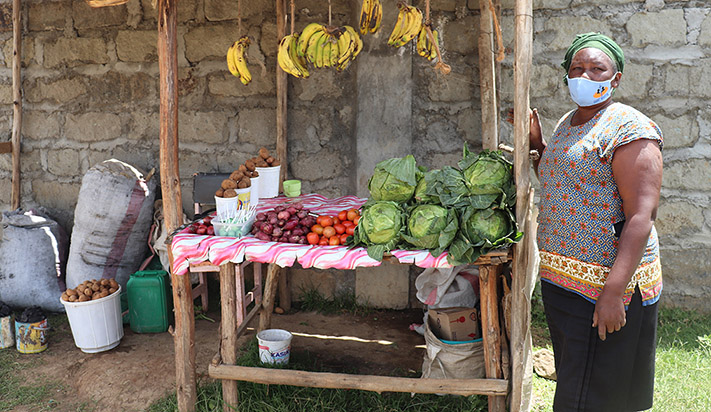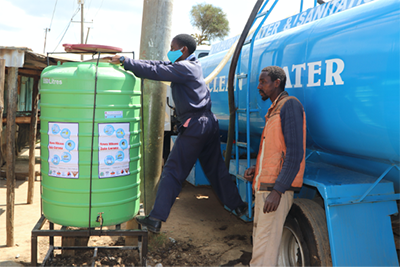Newsletter 4, November 2020

The situation
The first coronavirus was confirmed in Kenya in mid-March 2020. Shortly afterwards, the government closed the schools and issued the first travel restrictions. Shortly before Easter, the big cities were completely isolated because that was where the number of cases rose the fastest. And also because Kenyans traditionally travel to the countryside over Easter to visit their parents and grandparents. The aim was to prevent rapid spreading. There was also a night curfew installed and the sale of alcohol was banned. The open markets were closed or moved to more open areas. The number of confirmed cases peaked in the second half of July and then quickly declined, whereupon the government gradually relaxed the various measures. As of October 2020, Kenya has just over 40,000 confirmed cases out of a population of 48 million. 780 people died of the coronavirus.
 In Nyahururu this meant that the market now takes place in the sports stadium, the stalls on the road-side disappeared for a time and one of the two large hotels closed completely because the tourists stopped coming. There were more children on the streets and their parents had to organize lunch for them, something that the school usually did.
In Nyahururu this meant that the market now takes place in the sports stadium, the stalls on the road-side disappeared for a time and one of the two large hotels closed completely because the tourists stopped coming. There were more children on the streets and their parents had to organize lunch for them, something that the school usually did.
Daniel
When St. Martin CSA went to Daniel, he and his four siblings had just changed their accommodation because the last solution was too expensive. Daniel is a young man of 18 who had to take responsibility for his younger siblings when his mother passed away. He had to drop out of secondary school to do odd jobs for his family. With the beginning of the COVID-19 pandemic, these jobs fell away. His mother went to St. Martin CSA,
to get advice about a dispute with her husband. Shortly afterwards she was admitted to the hospital, where she died. The children's father ran away and the relatives refused to take the five children in. St. Martin CSA brought a food package and organized an apprenticeship training for Daniel. This allows him to continue his education and at the same time earn some money for himself and his siblings.
Reactions from the partner organizations
 St. Martin CSA and 'L’Arche Kenya acted quickly: They procured face masks for the staff and the employees were sent to the home office. The children's homes and the home for the handicapped people were isolated and the activities in the villages stopped because many of our beneficiaries belong to the risk groups: addiction patients with already poor health, HIV-positive, or poorly nourished children. After Easter, it became clear that the government's measures hit particularly hard those families who were already living in precarious economic conditions. The sale of snacks at the bus station was banned or greatly diminished because nobody was travelling anymore. The job as a cleaner in the restaurant was terminated because the guests stayed away. And no one wanted to hire day labourers for fear of infection. Many of these families are dependent on a small but daily income to get food on the table. If this doesn’t come in hunger will knock on the door.
St. Martin CSA and 'L’Arche Kenya acted quickly: They procured face masks for the staff and the employees were sent to the home office. The children's homes and the home for the handicapped people were isolated and the activities in the villages stopped because many of our beneficiaries belong to the risk groups: addiction patients with already poor health, HIV-positive, or poorly nourished children. After Easter, it became clear that the government's measures hit particularly hard those families who were already living in precarious economic conditions. The sale of snacks at the bus station was banned or greatly diminished because nobody was travelling anymore. The job as a cleaner in the restaurant was terminated because the guests stayed away. And no one wanted to hire day labourers for fear of infection. Many of these families are dependent on a small but daily income to get food on the table. If this doesn’t come in hunger will knock on the door.
Janet
The measures to contain the COVID-19 pandemic also included the closing of the courts. This affected Janet, who had a case that awaited judgment. Her brother had tricked her mother into selling most of her land and transferred the money to his own bank account. Janet asked St. Martin CSA for legal advice and succeeded to freeze the bank account. Consequently, the brother evicted them from their house, and Janet had to give up her job to care for the ailing mother. She moved with her and a daughter of her own into an empty one-room shop, where the COVID-19 measures caught them: The courts closed down, and the opportunities for casual work decreased significantly. Janet didn’t know how to pay for the medical care for her mother, and when St. Martin CSA contacted them, they were down to the last packet of rice. The ERP programme supported them with foodstuff for two months and with medical therapy for the mother.
Emergency Relief Project
 St. Martin CSA recognized this situation and, thanks to quick support from a donor organization and in cooperation with L’Arche Kenya, set up an emergency relief project. Several tons of basic foodstuffs were bought, repackaged in monthly rations, and distributed to 200 families in need. At the same time, hand washing stations were set up in the poorer quarters and the residents were instructed about the various hygienic requirements. The families were then visited regularly and, if necessary, supplied with additional food packages. With the relaxation of the measures, St. Martin CSA increasingly distributed start-up kits for (re)building a small business or seeds and fertilizer for replanting the field.
St. Martin CSA recognized this situation and, thanks to quick support from a donor organization and in cooperation with L’Arche Kenya, set up an emergency relief project. Several tons of basic foodstuffs were bought, repackaged in monthly rations, and distributed to 200 families in need. At the same time, hand washing stations were set up in the poorer quarters and the residents were instructed about the various hygienic requirements. The families were then visited regularly and, if necessary, supplied with additional food packages. With the relaxation of the measures, St. Martin CSA increasingly distributed start-up kits for (re)building a small business or seeds and fertilizer for replanting the field.
Margaret
Margaret, 56 years old and a former alcoholic, lives in a small hut made out of corroded metal sheets and carton. She washes clothes and does other casual work to feed her 13 grandchildren. Her four children all struggle with addiction issues and HIV. Providing for these many people is a challenge in normal times, with the COVID-19 restrictions it became near to impossible. Also, Margaret became ill a few months ago and couldn’t leave the bed. The neighbours supported her family with whatever they could, but when St. Martin CSA arrived, there was no food in the house, not even a fire was lit. Margret was very grateful for the food. St. Martin volunteers pointed out that there were several beneficiaries in the neighbourhood who were not able to take their anti-HIV-drugs in the recommended way because they also had no food. Hence St. Martin CSA provided some additional foodstuff for them, and Margaret prepared them a meal.
New work realities
 What did all this mean for my commitment? At the entrance to St. Martin CSA I have to wash my hands and my temperature is taken. Wearing a mask is mandatory. The offices have been rearranged so that a maximum of two people can sit in the same room. And the common coffee break has been abolished, we now receive thermos jugs delivered to the offices. During the home office time, we had the opportunity to complete basic documents for communication work (strategy, brand book, etc.) and I used the time to develop various workshops. Since everyone was forced to work on their laptops at home, my colleagues are now more sensitized to the various IT solutions for collaboration. And since events with many people are problematic, we are increasingly relying on the local radio and television stations. My workshops came just at the right moment.
What did all this mean for my commitment? At the entrance to St. Martin CSA I have to wash my hands and my temperature is taken. Wearing a mask is mandatory. The offices have been rearranged so that a maximum of two people can sit in the same room. And the common coffee break has been abolished, we now receive thermos jugs delivered to the offices. During the home office time, we had the opportunity to complete basic documents for communication work (strategy, brand book, etc.) and I used the time to develop various workshops. Since everyone was forced to work on their laptops at home, my colleagues are now more sensitized to the various IT solutions for collaboration. And since events with many people are problematic, we are increasingly relying on the local radio and television stations. My workshops came just at the right moment.